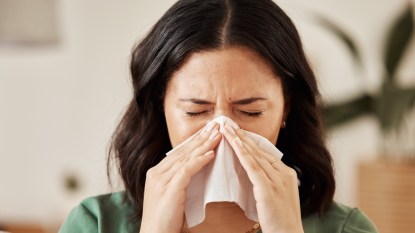Is Your Cold Actually Allergies? MD Reveals the #1 Symptom That’s a Dead Giveaway
Plus, 6 strategies to feel better fast—and the medication one allergist says you should avoid
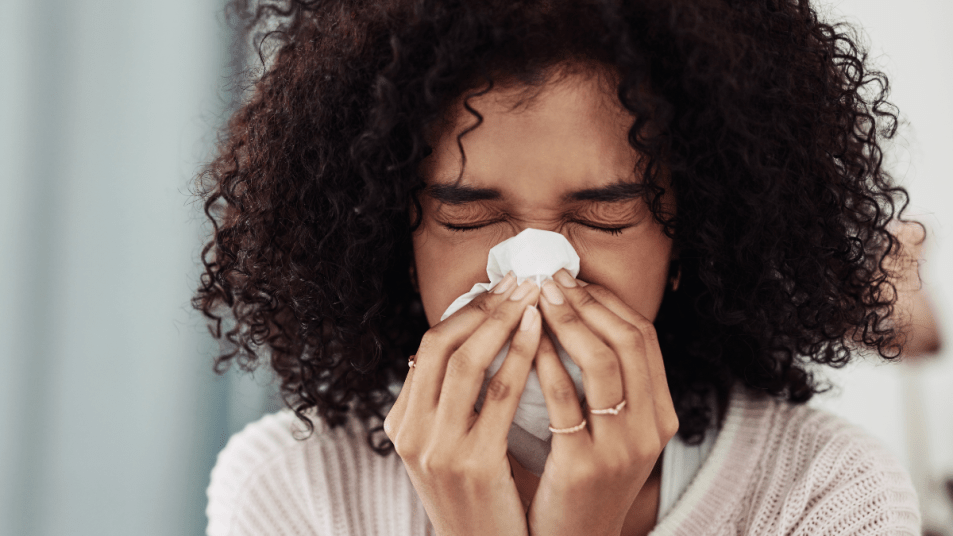
If you’re suffering from symptoms like a runny nose, a sore throat and watery eyes, you probably have two questions. First: Do I have a cold or allergies? And second: What can I do for relief?
Even though colds and allergies present similar symptoms, knowing how to tell the difference is crucial. Since most over-the-counter remedies only work for one or the other, you need to make the right choice. Here, allergists and immunologists explain the difference between cold and allergy symptoms and provide tips for near-instant relief!
Expert advice: How to tell whether it’s a cold or allergies
Allergies and colds both irritate the nose, throat, eyes and respiratory system. However, Rita Kachru, MD, a board-certified allergist and immunologist at UCLA Health in Los Angeles, says there’s one distinct difference: itching.
When you have allergies, “it means your immune system is looking at things that are harmless and thinking they’re a virus or a parasite,” Dr. Kachru explains. “This confuses your immune system and causes it to mount a reaction, triggering inflammation.” That inflammation causes swelling, redness and itching that often affects the eyes, nose and skin.
Martin Smith, MD, a practicing allergist and immunologist and co-founder of the skincare company Untoxicated, agrees, adding that symptom duration can also help you differentiate between cold and flu symptoms. For example, colds “usually clear up in two weeks or less, while allergies can last for weeks to months,” Dr. Smith says. In other words: if your symptoms last longer than 14 days, you probably have allergies.
Related: Mullein Tea Is a Little-Known Brew That May Be the Best Remedy for Colds, Flu & More
Check out these lists of common symptoms from Dr. Smith:
Common cold symptoms
- Runny nose, congestion & post-nasal drip
- Sore throat
- Fever
- Body and muscle aches
- Fatigue
- Yellow or green mucus
If your symptoms indicate a cold, these common cold remedies can help you feel better fast.
Common allergy symptoms
- Runny nose, congestion & post-nasal drip
- Itchy, watery eyes
- Itchy mouth
- Clear mucus
Is it possible to develop seasonal allergies later in life?
If you’ve never had seasonal allergies up to this point, you might assume you’re in the clear, but unfortunately, that isn’t the case. Although rare, you can develop seasonal allergies later in life. The reason? Hormones.
“Hormones are a very big factor in determining whether someone will present with allergic symptoms,” Dr. Kachru says. And, although men and women both experience hormone fluctuations, those caused by pregnancy, perimenopause and menopause are particularly significant shifts. As a result, Dr. Kachru says all women have about a 33% chance of developing allergies during these stages. (Click through to see how taming allergies can help stop someone from snoring.)
Geography can also play a role. If you move to an area where the types of pollen are different than what you’re used to, your body might respond with an allergic reaction, explains Dr. Smith. Even so, these changes don’t happen overnight. “It usually takes 3 to 4 seasons of exposure for you to become ‘sensitized’ and start experiencing allergy symptoms,” he says.
Related: These Teas Ease Allergies Naturally + the Timing Trick That Boosts the Benefit
6 doctor-recommended strategies for allergy relief
Now that you know how to tell the difference between allergy and cold symptoms, you’re probably wondering what you can do for quick and effective relief. Here are our top recommendations:
1) Close the windows
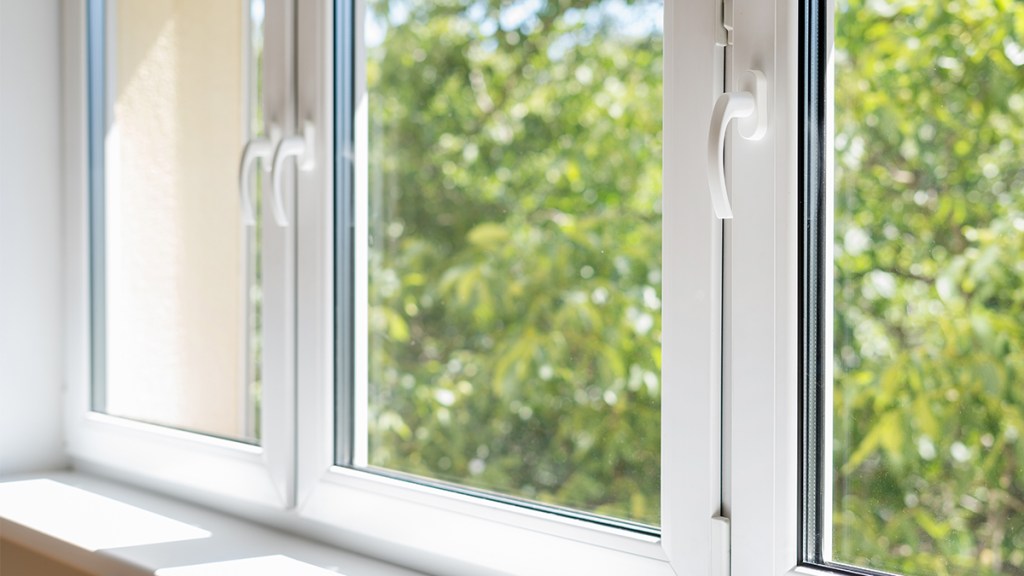
A cool spring breeze can help soothe you to sleep, but it can also make your allergies worse. “Grasses, trees and weeds tend to pollinate at night,” Dr. Kachru explains. “So, closing your windows before you go to bed can decrease pollen exposure.”
Since pollen can enter your home in other ways, it’s also a good idea to check for drafty windows, damaged door seals and holes in your walls and roof. Addressing these potentially problematic areas can keep allergens from squatting in your sanctuary.
Related: MDs: 7 Surprising Symptoms Caused by Weather — And How to Prevent Them
2) Hop in the shower
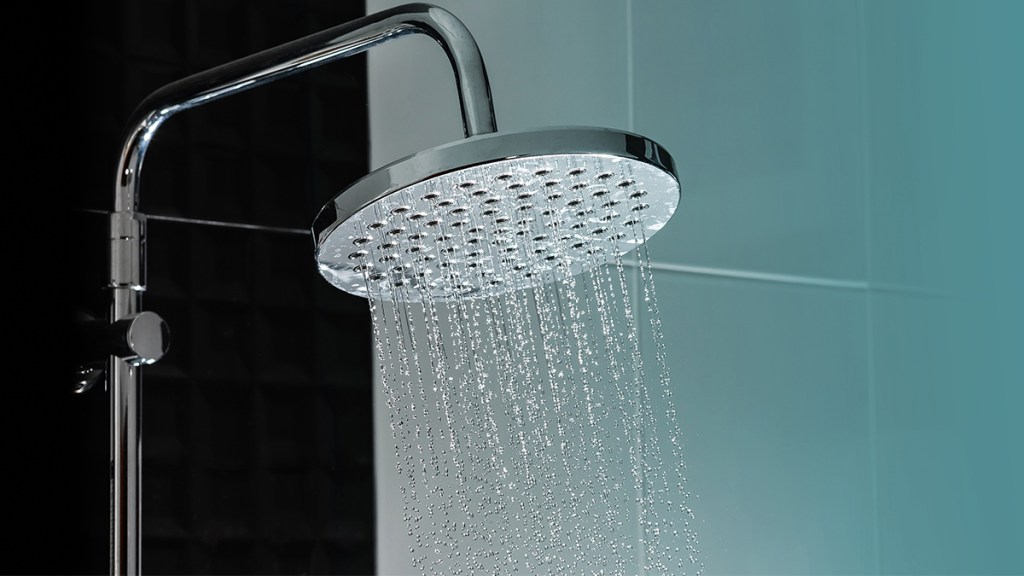
Rinsing off in the shower after a long day helps ease the transition into your evening. What you might not know is that it’s also a first-line defense against seasonal allergy symptoms. Dr. Kachru says that when pollen, spores and grass are abundant, they can easily cling to our hair and clothes. Quickly showering and changing your clothes eliminates most of those allergens, so they don’t follow you around and end up on your bedding.
3) Rinse your sinuses
“Saline nasal rinses are a great, drug-free way to wash allergens from your nose and reduce your symptoms,” Dr. Smith says.
What you’ll need: 2 cups of distilled water, 1 teaspoon of noniodized salt, 1 teaspoon of baking soda and a neti pot, squeeze bottle or medical syringe.
To do: Dissolve the salt and baking soda into 2 cups of warm distilled water. Transfer the mixture to your neti pot, squeeze bottle or syringe. Carefully insert the tip of the neti pot, squeeze bottle or syringe into either nostril and tilt your head to the side, then gently pour the rinse into your nostril so it comes out the other side. Repeat as needed.
This video provides step-by-step instructions:
“A nasal rinse clears your nose of whatever you’ve come in contact with,” Dr. Kachru explains. “It lets you clear pollen [and other allergens] from your nasal cavity before it triggers an inflammatory reaction.”
Related: Doctors Share the Best Ways to Relieve Sinus Pressure in the Ears + What You Should *Never* Do
4) Turn on the AC
Most folks save air conditioning for the summer when temperatures climb into the triple digits. Even so, you may want to use it earlier, particularly if your seasonal allergies are pollen-related.
“Air-conditioned environments filter out pollen allergens pretty effectively,” Dr. Smith says, particularly when driving. “Avoid the temptation to drive with your car windows open in the spring and fall. Instead, turn on the air recirculation and A/C.”
Dr. Smith knows what he’s talking about! One study published in the Journal of Asthma and Allergy concluded that closing car windows significantly reduced exposure to allergens like pollen and mold as well as toxins like tobacco smoke and air pollution.
5) Slip on sunglasses

If your seasonal allergies cause red, itchy or watery eyes, Dr. Kachru recommends wearing sunglasses. Indeed, a study published in the International Forum of Allergy & Rhinology concluded that wearing sunglasses during allergy season reduced allergy-related ocular symptoms and prevented the need for antihistamines.
Also smart: Consider wearing an N95 face mask. Several studies have confirmed that N95 masks are particularly effective at seasonal allergy prevention. One, published in Allegro Journal International, found that hospital workers who had allergic rhinitis (hay fever) experienced an overall reduction in allergy symptoms when wearing N95 masks. Another, published in the American Journal of Otolaryngology, concluded that people with seasonal allergies who wore face masks experienced a 36% decrease in allergy symptoms.
6) Take *this* type of over-the-counter allergy medication
The strategies above can help improve minor seasonal allergies, but if your symptoms continue or worsen, you might benefit from an over-the-counter allergy medication.
Dr. Kachru’s advice: “I would recommend long-acting antihistamines like Zyrtec, Claritin or Allegra. Avoid short-acting antihistamines, like Benadryl, because number one, they don’t work well, and number two, these antihistamines cause tachyphylaxis, or resistance.” In less scientific terms: you need more medication more often to get the same effects.
When to see a doctor
Seasonal allergies can be annoying, but they typically aren’t serious. Regardless, Dr. Smith says you should visit your doctor or an allergy specialist if your symptoms increase in severity. Dr. Kachru agrees, adding that professional help is particularly beneficial if your symptoms affect your sleep quality, energy levels or life, in general.
“Most people who end up in my office have tried all of the over-the-counter options and are still miserable,” Dr. Smith says. “This is when we start discussing [professional treatments, like] allergy shots. Allergy shots inject a minute dose of allergens just underneath the skin, which gradually desensitizes you to [their effects.]”
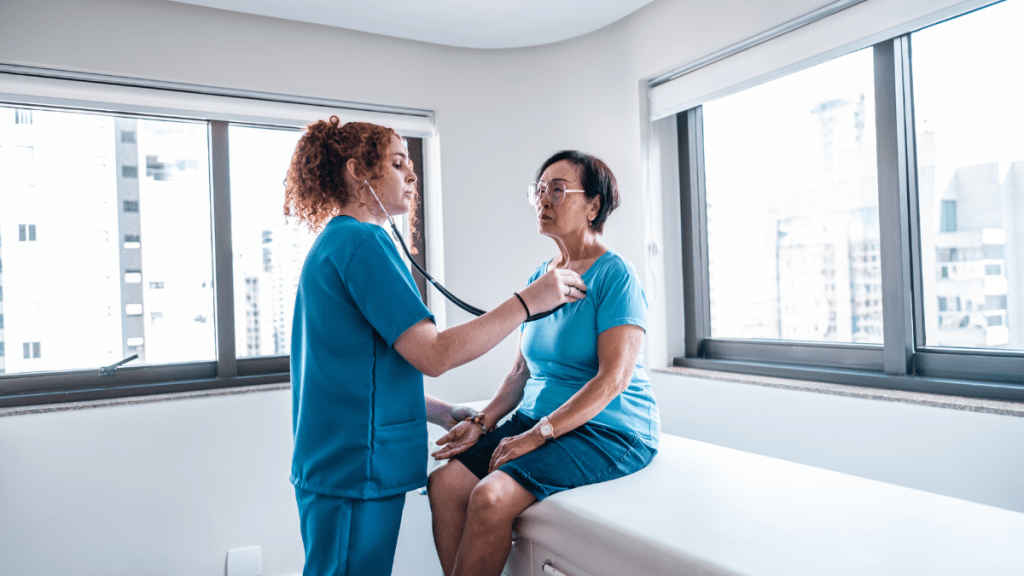
For more on allergy relief, read:
These Teas Ease Allergies Naturally + The Timing Trick That Boosts the Benefit
The Best Bedding for Allergies Will Stop Nighttime Sneezing Once and For All
Feel Tired and Blue –– And Don’t Know Why? Doctors Say Your Allergies May Be to Blame
This content is not a substitute for professional medical advice or diagnosis. Always consult your physician before pursuing any treatment plan.













